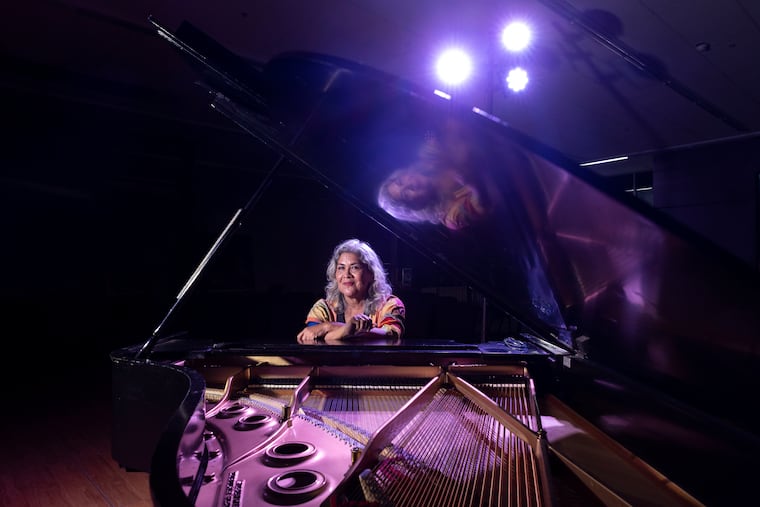A West Philly jazz composer goes under the surface looking for her roots
“My roots are in this town, and I feel very much grounded here,” says Sumi Tonooka.

Sumi Tonooka grew up in a big Victorian house on leafy Baring Street in the West Philadelphia neighborhood of Powelton Village.
Driving past the house on a mild September afternoon, the pianist recalled it as one steeped in activism that matched the sensibility of a neighborhood known for tolerance and an appreciation of community.
“Neighbors looked after each other,” she said. Tonooka, 67, may have left the neighborhood long ago. But an impatience with intolerance and a need for community continue to be animating forces in her life, the latter inspiring her latest composition, a Chamber Music America New Jazz Works commission, Under the Surface.
The work, which will premiere Nov. 12 at the Painted Bride Art Center, was composed in COVID lockdown not long after she returned to Philadelphia after five years in Seattle — just one stop in a peripatetic existence that has also taken her to Boston, New York City, Woodstock, Detroit, and a farm in Connecticut.
“In some ways, it’s about being back in Philadelphia,” she said of the new piece. “In some sense, it’s about how community works. My roots are in this town, and I feel very much grounded here in that way.”
The metaphor of roots is mirrored in her musical choices. Seated at the Painted Bride’s piano on that September afternoon, she deftly demonstrated how a pattern of carefully arrayed intervals is a motif connecting the horn lines through the piece’s five ensemble sections, much as a network of tree roots gains nourishment from a community’s soil.
Two weeks earlier, at a rehearsal with her full septet, the collective Alchemy Sound Project, those lines had come alive. Ensconced in the rustic isolation of a cabin deep in the woods of upstate New York, the musicians produced a sound as fulsome as the setting was lush.
To be sure, addressing the music’s complexities was daunting. Its harmonic movement was only subtly outlined by the momentary interlocking of horn lines, while Tonooka’s piano focused on clusters that provided textural appeal but little harmonic ballast. Technically, the work’s intervallic leaps and metric transitions proved challenging to execute.
“It’s hard music,” saxophonist Erica Lindsay, Tonooka’s longtime collaborator, said as the players exhaled after the rehearsal.
But Tonooka took it all in stride, adjusting parts and soothing nerves on the fly. By rehearsal’s end, the sonorities sung, the propulsion never wavered — and the piece was on its way.
Inspired by tolerance, Under the Surface contrasts with darker Tonooka works that reflect on the traumas suffered by her Japanese American mother and African American father.
“You carry the DNA of both your parents and their experiences,” she said.
Out of the Silence, a searing yet strangely lyrical indictment, draws on her mother’s experience interned in a World War II-era camp. Artfully combining spoken word and music that integrates jazz and classical traditions of the West and East, the mid-1980s work showcases Tonooka’s ability to synthesize musical idioms.
Having witnessed her father taken down for his activism at work, Tonooka, who uses her mother’s surname, has been motivated to explore his side of her ethnic identity. Informed by Philadelphia poet Sonia Sanchez’s writing on slavery, she produced Only the Midnight Sky and Silent Stars, a sprawling work of conscience performed in February by the San Francisco Conservatory of Music Orchestra.
“She breathes who she is,” said Edwin Outwater, the orchestra’s conductor. “Identity is embedded in her work.”
Mining her dual ethnic identity with musicians of African and Asian heritage, Tonooka presented In the Green Room in February at the Asia Society. Another work, When the Ancestors Speak, was performed on Nov. 5 at the Jazz Gallery. Both projects, in New York venues, feature her co-creator, vocalist and instrumentalist Jen Shyu, who lauded Tonooka’s “genius.”
Closer to home, Tonooka — “a Philly girl down to her last molecule,” in Lindsay’s words — has scored documentaries like Crosstown, about the fight against an expressway in Philadelphia. The score yielded “South Street,” which shows Tonooka’s wide-ranging pianism in hard-driving mode to great effect.
It also recalls the original Painted Bride, located on the titular street. That version of the Bride — its current incarnation on Market Street is its third — was where her teacher, legendary pianist Bernard Peiffer, introduced her to the public and where she subsequently cut her professional teeth in the early 1970s.
Since then, she has played with jazz masters and begun taking on more classical commissions. The latest, Sketch at Seven, is a set of variations based on a slice of Under the Surface and dedicated to her recently deceased partner, musician Billy McCoy. A New Year’s booking with the San Francisco Chamber Orchestra is being considered.
Meanwhile, her return this month to the Bride as a leader — years in the making — is an occasion.
“It’s like a homecoming,” she said.
Sumi Tonooka’s Alchemy Sound Project (Jazz on Market), Nov. 12, 4-6 p.m., Painted Bride Art Center, 5212 Market St., Phila., bit.ly/3FUkHYI.